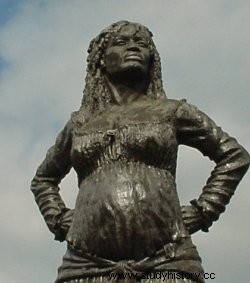Solitude, nicknamed the Mulatto Solitude because of her origins (circa 1772 – 1802?), is an important figure in the resistance of black slaves in Guadeloupe.
A life as a slave
 Today little is known about the existence of Solitude. She was born in Guadeloupe around 1772, the result of the rape of her mother, Bayangumay, by a white sailor on the boat that deported her to the West Indies. Daughter of a slave mother and despite her miscegenation, the child, named Rosalie, becomes a slave herself. For more than twenty years, Solitude has known the horrors of slavery, heavy punishments, deprivation of freedom and oppression, in Guadeloupe.
Today little is known about the existence of Solitude. She was born in Guadeloupe around 1772, the result of the rape of her mother, Bayangumay, by a white sailor on the boat that deported her to the West Indies. Daughter of a slave mother and despite her miscegenation, the child, named Rosalie, becomes a slave herself. For more than twenty years, Solitude has known the horrors of slavery, heavy punishments, deprivation of freedom and oppression, in Guadeloupe.
Parallel to the French Revolution, unrest and riots began to agitate Guadeloupe in the early 1790s. After the execution of Louis XVI, the Terror reverberated as far as the West Indies and families of planters, as well as members of the clergy , are executed or flee. Slaves desert, forming communities of maroons (runaway slaves). On February 4, 1794, the Convention abolished slavery and made all the men populating the colonies French citizens enjoying the same rights. But when the news reaches Guadeloupe, the island has fallen under British occupation.
Recovery from slavery
While many former slaves, having barely achieved freedom, enlist to fight against the English, Solitude joins a community of maroons with whom she lives for a while. The euphoria of abolition was short-lived, however:in 1802, Napoleon Bonaparte reestablished slavery, and instructed General Richepance to put down any rebellion and put the former slaves back in irons. On May 4, 1802, an army of four thousand men landed in Pointe-à-Pitre. Infantry Colonel Louis Delgrès, an intellectual of Martinican origin, then called for resistance, and many women and men took up arms.
Pregnant by her companion who fights with her, Solitude arms herself with a pistol and takes part in all the fights, as does Louis Delgrès' companion, Marthe-Rose. Quickly, the French forces cornered the resistance fighters in a fortress and led a violent siege. In desperation, Louis Delgrès stuffed the building with barrels of gunpowder. When the army entered it on May 28, 1802, a great explosion rang out. Among the three hundred resistance fighters entrenched, a few survived the explosion, including Solitude. Arrested, she is not executed immediately, because of her pregnancy. On the island, the repression of the revolt is bloody and causes thousands of victims.
Solitude gave birth on November 28, 1802, to a little boy who was born a slave. The sources say she was "tortured" the next day, which seems to indicate that she was executed. However, it is possible that she survived.
